
- Shandong Loyal Industrial Co.,Ltd.
- SHORT-CUT PASTA PRODUCTION LINE LONG-CUT PASTA PRODUCTION LINE INSTANT PASTA PRODUCTION LINE
Home> Application> The Future of Pasta Production: Fully Automated Macaroni Machines for Maximum Efficiency and Energy Savings

The Future of Pasta Production: Fully Automated Macaroni Machines for Maximum Efficiency and Energy Savings
The Future of Pasta Production: Fully Automated Macaroni Machines for Maximum Efficiency and Energy Savings
Introduction
Pasta production has a rich history that spans centuries, evolving from traditional artisanal methods to more sophisticated manufacturing processes. The constant pursuit of efficiency and sustainability has led to the exploration of innovative technologies in the industry.The Macaroni Pasta Maker Machines technology of Shandong Luoya Industrial Co., Ltd. has introduced advanced technologies from lazzaretti and Pasta Technologies Group (PTG) .
Current Challenges in Pasta Production
Despite the popularity of pasta, the current production methods face challenges related to manual labor, energy consumption, and maintaining consistent quality. Manual labor is inherently limited by human capacity, and the energy-intensive nature of traditional pasta production raises environmental concerns. Quality control remains a critical issue as variations in production can affect the end product.
Emergence of Automated Macaroni Machines
To address these challenges, there is a growing trend towards the adoption of automated macaroni machines. These systems offer a comprehensive solution by providing an overview of automated processes and seamlessly integrating advanced technologies into the pasta-making industry. Brands like Barilla, Banza, and Colavita are at the forefront of this technological shift.
Benefits of Fully Automated Macaroni Machines
Automated macaroni machines offer a myriad of benefits, including enhanced production efficiency, significant reduction in energy consumption, and improved quality control and consistency. Artificial intelligence applications, robotics, and smart sensors play a pivotal role in achieving these advantages.
Technological Advancements in Pasta Manufacturing
The integration of artificial intelligence applications in pasta production allows for real-time data analysis, optimizing the manufacturing process. Robotics in macaroni production ensures precision and speed, contributing to higher output and quality. Smart sensors and data analytics further refine the production process, ensuring a more controlled and efficient workflow.
Case Studies of Successful Implementations
Leading companies, such as Barilla, Banza, and Colavita, have successfully embraced automated macaroni machines, showcasing tangible improvements in productivity. Real-world examples highlight the seamless integration of technology, resulting in increased production capacity and consistent product quality.
Future Trends and Innovations
Predicting the future of pasta production involves envisioning emerging technologies such as advanced robotics, machine learning, and continuous advancements in automation. These innovations are poised to revolutionize the industry, making pasta production even more efficient and sustainable.
Environmental Impact and Sustainability
Comparing the energy consumption of traditional pasta production with that of automated systems reveals a significant reduction in the carbon footprint. Additionally, the adoption of eco-friendly practices in automated pasta production contributes to overall sustainability, aligning with global environmental goals.
Challenges and Concerns in Adoption
Despite the evident advantages, the adoption of automated macaroni machines faces resistance in traditional industries. Overcoming this resistance requires addressing potential drawbacks and risks associated with the new technology, emphasizing its long-term benefits.
Conclusion
In conclusion, the future of pasta production lies in the hands of fully automated macaroni machines. The benefits, from increased efficiency to energy savings and improved sustainability, position this technology as the catalyst for the evolution of the pasta manufacturing industry. As we move forward, embracing technological advancements in pasta production will undoubtedly shape a more efficient, sustainable, and innovative future.
Common Questions about Pasta Macaroni Machines
What are pasta macaroni machines?
Pasta macaroni machines are advanced, automated systems designed to streamline and enhance the pasta production process. These machines leverage cutting-edge technologies, including artificial intelligence, robotics, and smart sensors, to achieve maximum efficiency and quality in macaroni manufacturing.
How do automated macaroni machines differ from traditional methods?
Automated macaroni machines differ from traditional methods by significantly reducing reliance on manual labor. Traditional pasta production involves extensive human effort, while automated machines integrate technology to perform tasks with precision and speed. This shift results in enhanced productivity, reduced energy consumption, and improved consistency.
Which brands are leading the way in adopting automated macaroni machines?
Several prominent brands are spearheading the adoption of automated macaroni machines. Notable names in the industry include Barilla, Banza, and Colavita. These brands have embraced technological advancements to optimize their production processes, setting a benchmark for the integration of automation in the pasta manufacturing sector.
What benefits do fully automated macaroni machines offer?
Fully automated macaroni machines offer a range of benefits, including enhanced production efficiency, reduced energy consumption, and improved quality control. The incorporation of artificial intelligence, robotics, and smart sensors ensures a seamless and optimized pasta manufacturing process, ultimately leading to a more sustainable and consistent end product.
How do technological advancements contribute to pasta manufacturing?
Technological advancements play a crucial role in transforming pasta manufacturing. Artificial intelligence applications enable real-time data analysis for process optimization, robotics ensure precision and speed in production, and smart sensors facilitate data analytics for quality control. These advancements collectively contribute to a more efficient and controlled pasta production environment.
Can traditional pasta producers benefit from adopting automated macaroni machines?
While there may be resistance in traditional industries, the adoption of automated macaroni machines offers significant benefits even to traditional pasta producers. The technology improves efficiency, reduces labor dependency, and enhances overall product quality. Overcoming initial challenges and embracing automation can position traditional producers for long-term success in the evolving pasta manufacturing landscape.
What is the future outlook for pasta production with the integration of advanced technologies?
The future of pasta production appears promising with the continued integration of advanced technologies. Predictions include further advancements in robotics, machine learning, and automation, driving the industry towards increased efficiency and sustainability. The ongoing innovation in pasta manufacturing sets the stage for an exciting and transformative future in the global food production landscape.
Contact Us

- Shandong Loyal Industrial Co.,Ltd.
- Telephone+86 13176674591
- Email[email protected]
- WhatsApp+86 13176674591
- WeChat13176674591
- AddressC623, Jiahui Global Plaza, No. 548, Beiyuan Street, Tianqiao District, Jinan City, Shandong Province
- Factory AddressADD -300m North of Zhangxia Industrial Park, Binhe Road, Zhangxia Town, Changqing District, Jinan
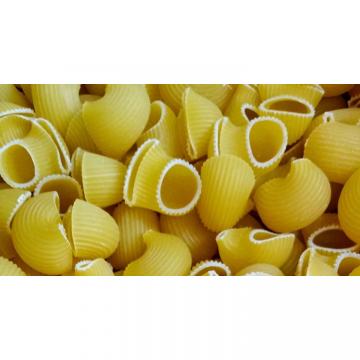

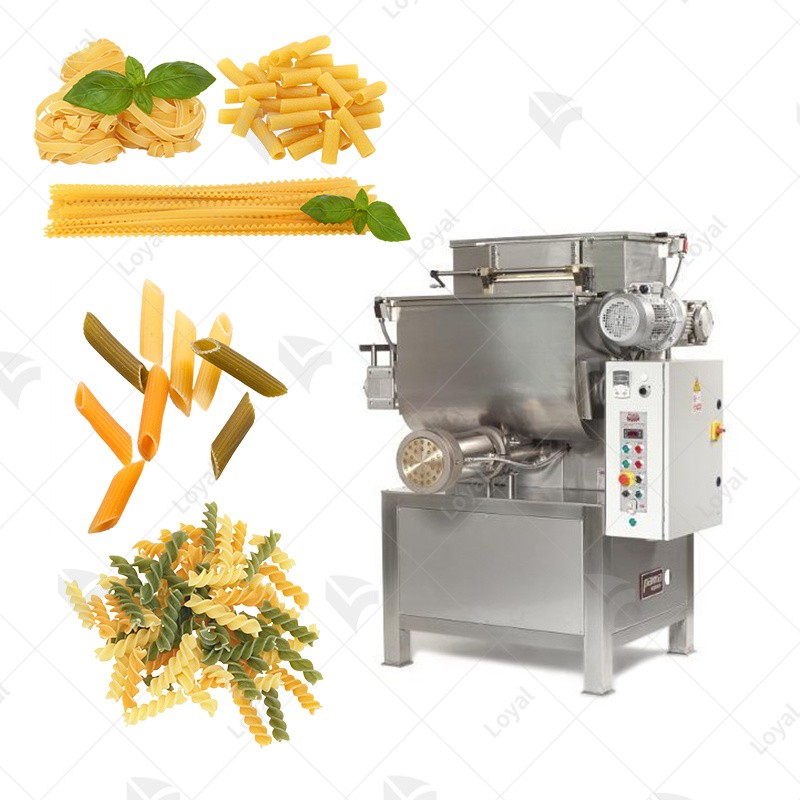

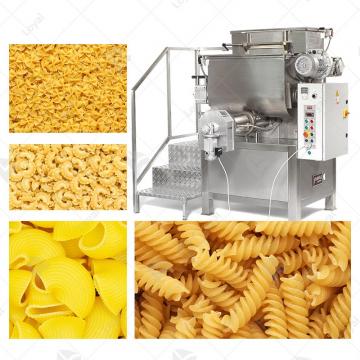
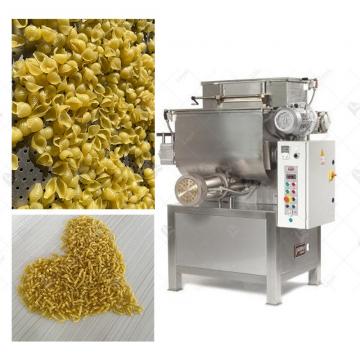 PRECOOKED PASTA PRODUCTION LINE
PRECOOKED PASTA PRODUCTION LINE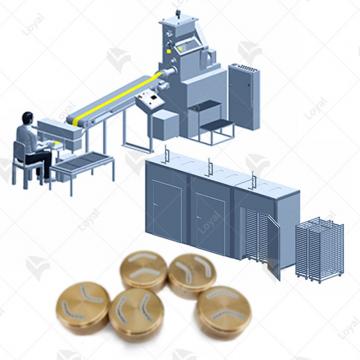 Combined Automatic Pasta Sheeter
Combined Automatic Pasta Sheeter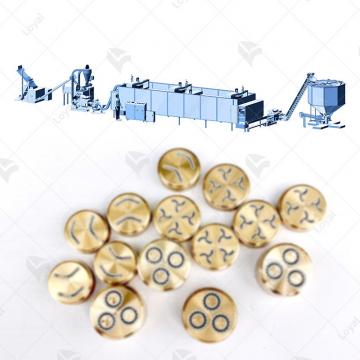 Short-Cut Pasta Production Line
Short-Cut Pasta Production Line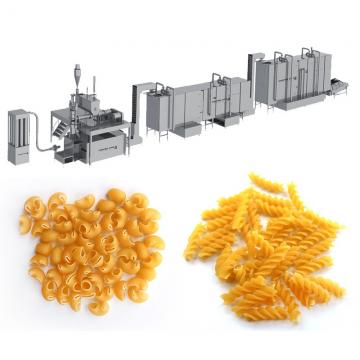 Vacuum Extruder Pasta Machine
Vacuum Extruder Pasta Machine